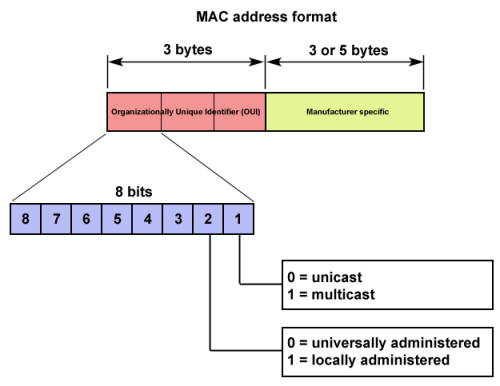User Tools
Sidebar
Table of Contents
MAC Address
This menu has settings to let you electronically change (or “spoof”) the MAC Address of various network interfaces. This function does not change the factory-assigned MAC Address in the device's chip. It just overlays a different address in software.
The MAC Address set by the manufacturer is called a Universally Administered Address (UAA). A MAC Address assigned by a System Administrator is called a locally-administered address (LAA).
The first three octets (or group of 8 bits) is the Organizationally Unique Identifier. The OUI is a 24-bit number that identifies the manufacturer, organization, or vendor. The last three pairs of digits are a number specific to the device, or the “Network Interface Controller (NIC)-specific portion” of the address.
For common device names in FreshTomato, see the FAQ page.
How Default WAN MAC Addresses are Derived
Since r2021.8, FreshTomato configures the WAN port's default MAC Address (based on eth0 / LAN MAC Address) differently.
FreshTomato now sets wanX MAC Addresses as follows:
- WAN ⇒ eth0 MAC + (decimal) 16 [in 2021.7 and earlier: eth0 = MAC + 1 (decimal value)]
- WAN2 ⇒ eth0 MAC + (decimal) 17
- WAN3 ⇒ eth0 MAC + (decimal) 18
- WAN4 ⇒ eth0 MAC + (decimal) 19
For example, if a router has LAN Ethernet MAC Address: 78:30:AF:DB:0A:F8:
r2021.8 and later: would set the WAN MAC Address to 78:30:AF:DB:08:DC, (CC + 16).
r2021.7 and earlier: would set the default WAN MAC Address as 78:30:AF:DB:08:CD (CC + 1).
This is illustrated in the following screenshots.
A WAN MAC Address, as caclulated in r2021.8 and later:
A WAN MAC Address, as calculated in r2021.7 and earlier:
In FreshTomato 2021.7 and earlier, this image shows the default MAC Address calculated/set. Initially, a different address is displayed, (after “erase all data in NVRAM memory thorough” has been done). This discrepancy was fixed in r2022.1.
WAN Port: here, enter a MAC Address to assign to the WAN interface.
- Default - leaves the fixed, factory-assigned MAC Address
as the interface's MAC Address. - Random - assigns a random MAC Address to the device.
- Clone PC - assigns the same address as that of the client
that is connected to the web interface.
Some cable and other Internet providers authorize a cable modem or other device based on its MAC address. Every network has a unique address. When your modem requests an address from the provider's DHCP server, the provider will grant it or deny it network access based on its MAC Address.
Some cable companies also authenticate the network card in your client device after you first log on to their network. They record the MAC Address of that device. Doing so allows them to prevent you from using a different LAN client device on their service than the first one you used. To use another device, you must pay more. In this way, they can force you to use the one client device you've always used.
If the provider's network detects a different MAC Address than that of the original device, it will deny the client device network access. It will only allow devices known to them, in good standing. However, if you let FreshTomato clone your original device's MAC Address, it will fool a cable provider into thinking you're still using the same client device interface with their service. Your router will be allowed on the network. They don't care which device you use; the MAC is associated with your billing. Often, if you tell them you have a new device, they will change the MAC Address record in their system.
Wireless Interface eth1: here, enter a MAC Address to assign to WiFi interface “eth1”.
- Default - leaves the fixed, factory-assigned MAC Address as
the interface's MAC Address. - Random - assigns a random MAC Address to the device interface.
- Clone PC - assigns the same MAC Address as the interface of the client
currently connected to FreshTomato's web interface.
Wireless Interface eth2: here, enter a MAC Address to assign to WiFi interface “eth2”.
- Default - leaves the fixed, factory-assigned MAC Address
as the interface's MAC Address. - Random - assigns a random MAC Address to the device interface.
- Clone PC - assigns the same MAC Address as the interface of the client
currently connected to FreshTomato's web interface.
Wireless Interface wl0.1: enter A MAC Address to assign to interface “wl0.1” (usually first VWLAN).
- Default - leaves the fixed, factory-assigned MAC Address as
the interface's MAC Address. - Random - assigns a random MAC Address to the device.
- Clone PC - assigns the same MAC Address as the interface of
the client currently connected to FreshTomato's web interface.
MAC Address Notes
Until at least r2021.8, changing the WiFi MAC Address in FreshTomato could cause problems. Changing the first 3 octets of the MAC Address could cause issues, such as drops on WiFi interfaces.
For details, see: Bitbucket: drops, and upon restart attempt, all LAN interfaces lose internet connectivity



